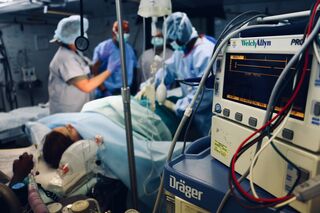Trauma
The Psychological Trauma of Having a Loved One in the ICU
What one mother learned
Posted December 3, 2020 Reviewed by Matt Huston
This is the first of a series of articles on ICU trauma and how to cope.
Part 2 is here: Making an Emotional Recovery Together by Ethan Lester, Ph.D.
Part 3 is here: Managing Emotional Distress in the Hospital and ICU by Ethan Lester, Ph.D.
Part 4 is here: What Can I Do if a Family Member is in the COVID ICU? by Irina Wen, Ph.D.
This post was written by Maureen O'Reilly-Landry, Ph.D.
Years before “coronavirus” and “pandemic” became common vocabulary for every school-aged child, I presented versions of this article at various professional conferences. It is included in this series because it describes my own emotional experience of my son in the intensive care unit (ICU) and shows how emotional reverberations can persist even after a traumatic experience has ended.
Thirteen days before I was scheduled to present a paper about the traumatic psychological impact of serious illness and how psychoanalysts can help, my physician husband called me to talk about our then 20-year-old son, Michael. Michael had developed some unusual symptoms consisting primarily of weakness in his hands and feet. The tone of voice used by my husband, a doctor skilled in the art of breaking bad news to patients and families, was so calm and reassuring that I didn’t become alarmed—until he told me that we should both make the four-hour drive to see Michael as soon as possible. By the time we arrived that night, Michael was in the hospital and could no longer walk.
Birth of my psychological trauma
Feelings of extreme fear or terror in the context of perceived helplessness—this I knew intellectually to be the hallmark of psychological trauma.
Fear and helplessness were what I experienced as I watched Michael become progressively more paralyzed over the course of three days, until finally he could move nothing but his eyes.
And for two and a half months, they formed the bedrock of my experience during the time my son spent with a tracheostomy on a ventilator in the neurological intensive care unit.
I experienced them again the first time the blaring and frantic alarm sounded on Michael’s ventilator, signaling a respiratory emergency. The alarm, I felt, was letting me know that even this powerful instrument of advanced technology, on which we were all relying to keep Michael alive, might fail to breathe for him.
Fear and helplessness were what I felt when he was transported by helicopter, without me, still on a ventilator, from one hospital to another one more than 200 miles away.
Terror and helplessness were what I experienced the time his blood pressure suddenly plummeted to 70/40, and I stood to the side as doctors and other medical personnel swarmed around him.

Michael had developed a most severe case of Guillain-Barré Syndrome, a rare autoimmune disorder that attacks the peripheral nervous system.
Fortunately for this young, aspiring theoretical physicist, the illness leaves the brain intact. People—particularly the young—can recover from this illness. Thankfully, Michael’s recovery has been dramatic, and he is doing very well now.
I follow this happy ending with reflections on the interpersonal aspects of my intense hospital experience and some specific actions on the part of staff that helped me to cope during this enormously stressful time.
What I appreciated
Acknowledgment. During Michael’s lengthy hospitalization, I came to appreciate the critical role relationships with staff played in my own psychological well-being. My first memory of the neurological ICU was of Michael lying in his bed surrounded by a large group of doctors who were discussing not if, but when, he would be placed on a ventilator. I stood at the back of the crowd, unable to hear everything being said. One of the doctors engaged me in conversation. I guessed he realized I must be Michael’s mother. I don’t recall what we spoke about. I remember only that it felt good—or at least less bad—to be acknowledged rather than ignored.
Participation. Even while on the ventilator, Michael spent much of his time bright and alert. But his body was completely paralyzed, and he was unable to speak. During the long hours I spent by his bedside, I would talk and read to him, but otherwise did not know what I could do or say to fill the hours.
I was enormously grateful when one nurse taught me to do physical therapy exercises that involved taking Michael’s hands and slowly flexing his fingers and eventually moving on to his arms and legs. I was able to participate in his recovery by helping him to keep his body active.
I approached it tentatively, but being able to do this little bit afforded me great relief. I felt less helpless and more worthwhile. Many other overwhelming feelings and fears I was experiencing, however, remained unaddressed.
Fear of causing harm
During Michael’s lengthy recovery process, he and I reflected together on his three-month ICU stay. “You always seemed like you were afraid you were going to break me,” he told me. His words felt jarring, but I knew he was right.
Being surrounded by the large machines I knew were keeping my son alive had felt crushingly intimidating. My worst nightmare was that I would do something to inadvertently kill my son.
Long after Michael was out of the hospital and back to his life, a close friend observed that I had become much more tentative and hesitant in my demeanor and behavior.
Though consciously I believed my trauma had ended, my body continued to express the fear that my actions might have devastating consequences.
The double trauma of COVID-19
For COVID-19 patients and their families, the trauma of ICU hospitalization is compounded by the need to stay isolated from others in order to contain the virus.
However, this deprives patient and family of the most powerful resource for coping with trauma—the sense of connectedness with others.
In future articles in this series on ICU trauma, we will cover ways to cope with the anxiety of the ICU experience, including what to do when there is a family member in the COVID ICU.
Dr. Maureen O’Reilly-Landry is a clinical psychologist, psychoanalyst, and couple therapist with expertise in psychological trauma in medical settings and the interpersonal dimension of modern medicine. She co-chairs both the Psychoanalysis and Healthcare Committee (Division 39, APA), and the COVID Task Force group sponsoring this blog. Her edited book, A Psychodynamic Understanding of Modern Medicine was deemed "essential reading" by Contemporary Psychotherapy. She is on the clinical faculty in the Psychiatry Department of Columbia University Irving Medical Center and teaches a course on medical illness and physical suffering at the New York University Postdoctoral Program in Psychotherapy and Psychoanalysis.
References




